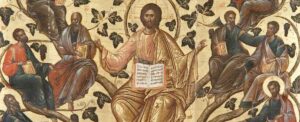A friend asked:
Why does Christ seem so disrespectful to his mother? In the Gospel, Christ calls his mother “Woman,” and answers her, “What have I to do with thee?” Why does he seem to speak so disrespectfully to her?
The short answer is that these were choices made by the Protestant translators of the King James Version.
Christ uses “Man” as a respectful, kind way to address a man. It means the same as “Sir” or “Mister” in modern English.
“Man, your sins are forgiven you” (Luke 5:20).
“Man, who made me a judge or arbitrator over you?” (Luke 12:14).
In the same way, in two passages Christ refers to his mother as “Woman” (Modern English “Ma’am” or “Lady.”)
One of those instances is on the cross, when the Lord gently gives his mother into St John’s care because she has no other sons to care for her. “Woman, behold [John], your son” (John 19:26-27).
The other time Christ uses this address is at Cana in John 2:8. The King James “What have I to do with thee” is a strained translation of the four Greek words Τί ἐμοὶ καὶ σοί — literally, “What to-me and to-you?” Here Christ is a grown man, and in public, so he does not call her “Mama.” Instead he addresses her respectfully like a noble woman. She says “They have no wine,” and he answers properly, “Ma’am, what is that to me and you?” Or, as the International Standard Version translates, “How does that concern us, dear lady?”
The Protestant translators of the first English Bibles exercised considerable latitude in translating passages regarding the mother of Christ. This is especially noticeable in the translation of Luke 11:27-28. In that passage, “A certain woman from the crowd raised her voice and said to him, ‘Blessed is the womb that bore you, and the breasts which nursed you!’”
In the King James version, Christ’s response is: “But he said, ‘Yea rather, blessed are they that hear the word of God, and keep it’” (v.28). In the Evangelical world this has been read as contradicting: “Wrong! Instead, blessed are those who hear…”
But this is the same Greek word (μενοῦνγε) that we meet in passages like,
“But I say, Have they not heard? Yes verily, their sound went into all the earth, and their words unto the ends of the world” (Romans 10:18).
“Yea doubtless, and I count all things but loss for the excellency of the knowledge of Christ Jesus my Lord” (Philippians 3:8).
In modern English, when the woman in the crowd says “Blessed is the one who bore you,” we might read the Lord’s reply as, “Yes indeed, and in fact, even more so, blessed are all those who hear the the word of God and keep it!”
Related: Surprising scriptures on the Queen Mother in the Kingdom of God »






